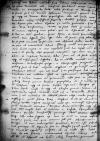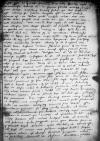⌊⌋ tuae, quas 1526-10-13⌊XIII die Octobris1526-10-13⌋ e ⌊Granata Baeticae⌋ ad me scripsisti, redditae mihi sunt ⌊Cracoviae⌋ 1526-12-22⌊XXII die Decembris1526-12-22⌋ et interea temporis nullas a te habui, olfeci tamen ex aliis quibusdam litteris tuis, quas posterius ad dominum ⌊Cracoviensem episcopum⌋ scripsisti, fratrem tuum ⌊Bernhardum⌋ istuc ad te pervenisse. Scribendum revera tibi etiam fuit tunc ad me, nam ego ⌊fratri⌋ tuo tunc praeter duas satis prolixas epistolas etiam speciatim nonnihil in mandatis dederam abeuntemque usque ad ⌊portum⌋, ubi navigaturi scaphas conscendere solent, prosecutus sum, iterum atque iterum tui mentionem faciens, tibi salutem nuntians et mandata, ne oblivioni traderet, identidem repetens. Cuius rei nullam te fecisse mentionem satis demiror, nisi forte Bernhardus tam inofficiosus fuit, quod nihil horum ad te detulit et ea, quae ego ad te scripsi et in mandatis dedi, Eurusque Notusque iactat odoratos nota per Armenios etc. Si vero saltem epistolas meas tibi reddidit, satis me tibi purgatum esse existimo, me (quod tu binis litteris tuis ad me scriptis suspicari videris) nulla re a te offensum esse, ut istis ipsis postremis litteris responderem, nullam per hoc totum tempus habere potui commodam occasionem. Hodie peropportune Georgius Hegel mihi se obtulit operamque daturum se recepit, ut has meas ad te perferri curaret. Si desiderio tuo (quo de omnibus rebus, quae hic apud nos et circum nos geruntur vel actae sunt, a me certior fieri cupis) satisfieri deberet, esset res infiniti operis iustique voluminis, quippe repetenda tibi esset perpetui huius anni historia. Itaque recentiora tibi dumtaxat perscripturo de veteribus praetermissis fortassis mihi veniam dabis, propterea quod de Hungaris per Turcos fusis, de nece Ludovici regis, de suffecto in Bohemiae Ferdinando, Hungariae Ioanne comite regna istic in aula caesaris exsistens nequaquam ignorare potes. Non enim credibile est, a Bohemiae rege ad fratrem copiose haec non perscribi et per veredarios transmitti.
Ediderant Tartari magnam stragem in Russia tunc, cum nos Gdani instaurandae fidei operam navavimus, et maxima praeda onusti (tametsi 70 milia eorum fuisse feruntur) impune transierant,
priusquam nos Gdano redeuntes fines Poloniae attigeramus. Tamen ex tanto Tartarorum numero manserant ignobiliorum circiter viginti milia in campestribus locis nobis finitimis, ut commodius (quod et secutum est) in ducatum Lithuaniae incursionem repeterent, dumque usque ad Turow omnia populassent, alia iterum praeda aucti, Decembri mense intensissimis frigoribus abitionem parabant, iamque in deserta sua ultra Chiow 30 milia pervenerant, ecce tibi dux Constantinus, coacta ex suis circiter 9 milium equitum manu cohorteque una peditum, quae in Chiowiensi arce de anno in annum excubat, praeter spem et omnium hominum opinionem, tam difficili anni tempore, dum iam securi suis solitudinibus se satis munitos esse existimant, eos assecutus fudit, caecidit et pene ad internecionem delevit praedamque omnem recuperavit, 700 vivis captis et uno regulorum, (nam duo copiis eorum praeerant) cum pluribus aliis gregariis interfecto. Ego rem ita se habere ex captivis Tartaris didici, sum enim ad facile credendum usque ad reprehensionem difficilis. Post ea nonnulla mutatio rerum est consecuta, Sawolhenses quippe a Chersonesiis secesserunt legatosque suos ad regem miserunt supplices, ut principem eorum Schachmet Soltanum, qui tot annos (ut scis) apud nos captivus detinebatur, eis redderet, quod et obtinuerunt. Dimissus est iam e Wilna, magna vi pecuniarum, argenti facti et pannorum pelliumque diversi generis donatus, prosequentibus eum 5 milibus equitum Lythfaniae usque ad initia Scythiae desertorum. Egressus est Wilna Aprili mense et usque ad Sluczko pervenit. Interea ab exploratoribus nostris nuntiatum sicut etiam a waywoda Moldaviae novo (nam turbulentus ille adolescens Martio mense morbo periit suffectusque ei quidam Ioannes Petrus, Stephani senis ex concubina filius) per legatos insignes significatum nobis est universam Chersonesiorum Tartarorum civitatem Boristene amne pertransito usque ad locum Album Templum dictum 15 miliaria a castello Chmyelnik, praefectura Przetslai Lanczkorunski pervenisse, ibidem stativa [agere]. Itaque denuo nobis suspicio est, aut enim iterum in terras nostras irruptionem parant, aut, quia certiores facti sunt Schachmetum dimissum, ad eum intercipiendum excubant. Quare ipse Schachmet princeps cum apparatu suo in Sluczko (quod quidem satis est munitum oppidum) constitit, ubi et modo est. Nos vero ex tota Polonia mercenarios equites cogimus. Sed h[i] nondum ad designatum eis locum, videlicet Leopolim, pervenerunt,
fortassis propter longinquitatem itinerum. ⌊Dux totius exercitus nostri Tarnoviensis⌋ comes noster in proxime praeteritis comitiis creatus, nam senex ⌊castellanus Cracoviensis Firley⌋, qui illud imperium gessit, mortuus est. Interim ⌊Leopolis⌋ ipsa in totum incendio absumpta est, ne bellicae quidem machinae relictae, ante octo circiter dies praefecto eius, amico tuo, hic ⌊Cracoviae⌋ coronato incedente. Nos una cum ⌊rege nostro⌋ cum totam hiemem tum mensem hunc Maium praeteritum non iniucunde transegimus in poculis, tui memores, vivimus enim adhuc gratias Deo, contubernium illud tuum, bibones scilicet et comedones, Skothniczski tamen et Pymo Ian morte nuper absumpti, atque ita et ⌊Ioannes Gravis⌋ ille tuus, quem quondam ⌊⌋ depinxeras, insulsisque mensam sermonibus implet, mortuus est et ⌊Raphael tuus Plocensis pontifex⌋, suffectus ⌊Cricius⌋, egregius poeta, sed nec ⌊Maro⌋ ipse decima parte ditatus erat, tametsi optimus poetarum fuerit tantumque ⌊Maecenatem⌋ habuerit. Triumphat iam noster et cum domino ⌊Cracoviensi castellano Christophoro de Szydlowiec⌋ ad pacificandum ⌊Ferdinandum regem⌋ cum ⌊Hungariae rege Ioanne⌋ ⌊Olmucium⌋ profectus est, necdum rediit, sed brevi redibit. ⌊Tertius noster⌋ ut ⌊Roma⌋ Urbis, ut ⌊Paulus⌋ Apostoli, sic ipse Oratoris nomen obtinuit, nam post exstinctum ⌊Ludovicum regem⌋ etiam apud modernum, item apud Ferdinandum, dum nuper ⌊Wratislaviae⌋ ageret, oratorem egit,
cf. Verg. A. IV 657-658 felix, heu nimium felix, si litora tantum numquam Dardaniae tetigissent nostra carinae. ⌊felix, heu nimium felix, si non etc.cf. Verg. A. IV 657-658 felix, heu nimium felix, si litora tantum numquam Dardaniae tetigissent nostra carinae. ⌋ Habes, quantum fieri potuit, de domesticis. ⌊Turcus⌋ quieturus est hoc anno. ⌊Filii⌋ ⌊Sophi⌋ defuncti, nescio quid ei negotii exhibent. Sed hoc nihil ad rem. ⌊Ferdinandus rex⌋ in ⌊Slesia⌋ nihil de religione immutavit, credo, quod maioribus rebus intentus fuerit. Nihil enim, nisi ⌊regnum Hungariae⌋ vindicare cogitat, sed et ⌊Ioannes rex⌋ non aliud agit, quam ut rex permaneat. ⌊Rex noster⌋ ab utroque tentatur, uterque auxilium et consilium eius aucupantur, sed in neutram partem flectitur, dum vellet, ut conicio, unumquemque terminis suis contentum esse, praevidet enim periculum etc. Itaque medius incedit. Ab initio Iunii mensis ⌊Olmucii⌋ per oratores utriusque regis concordia tentatur et tractatur, qui tractatus ad quintam decimam diem eiusdem mensis duraturi sunt. Unicas dumtaxat litteras ab oratoribus nostris habuimus, quibus scripserant parvam spem concordiae fore eo, quod ⌊Ferdinandi regis⌋ oratores aperte contendunt, ut ⌊comes⌋ ipse (nam regem eum vocare et scribere nefas ducunt) regno Hungariae cederet, ex adverso oratores ⌊Hungariae⌋ volunt, ut Ferdinandus ⌊Moraviam⌋ et ⌊Slesiam⌋ dimittat. Interea
alias litteras a nostris istinc ex ⌊Olmutio⌋ exspectamus. Quid futurum est, conicere non possumus. Ego pignore decertavi, quod pacificabuntur. Si perdam, perdam X aureos nummos et satis poenarum dabo stultae vaticinationis meae. Sed a nemine regum adhuc audio copias cogi, praeterquam quod Rosdrazewsky noster ad regem Hungariae profectus est, rege nostro inscio. Sed tamen hirundo non faciet ver etc. Videbimus, si vivemus. A ⌊Roma⌋ miranda nuntiantur iam urbem a Germanis captam et ⌊papam⌋ in arcem Adriani compulsum, iam Germanos ab Italis ad unum omnes caesos, sed tamen tu ista fortassis et his multo certiora melius istic scis. Nutrivit ⌊caesar⌋ anguem in caput suum. Vale et me ama et, si occasio dabitur, scribe aliquid.



